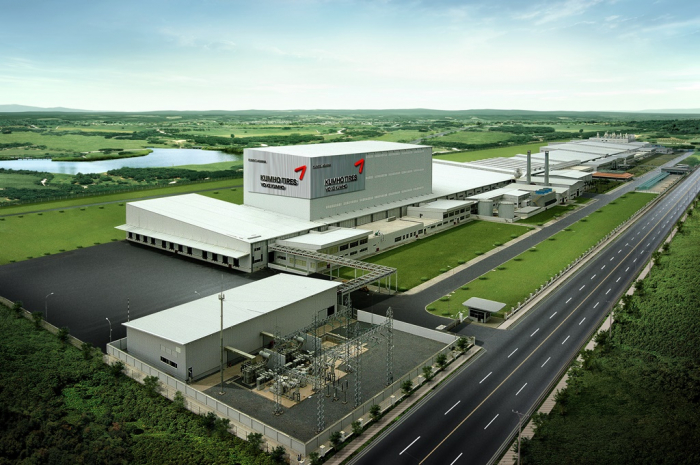Automobiles
Kumho Tire, labor union in tug of war over international plants
Kumho expands Vietnam plant and agrees on Saudi JV with Blatco, but unionized workers protest plans to increase overseas output
By Apr 08, 2022 (Gmt+09:00)
3
Min read
Most Read
LG Chem to sell water filter business to Glenwood PE for $692 million


Kyobo Life poised to buy Japan’s SBI Group-owned savings bank


KT&G eyes overseas M&A after rejecting activist fund's offer


StockX in merger talks with Naver’s online reseller Kream


Mirae Asset to be named Korea Post’s core real estate fund operator



Kumho Tire Co., South Korea’s No. 2 tire maker, struggled to agree with its unionized workers on more overseas plants although the company desperately needs to increase production in other countries to turn to the black amid surging logistics costs.
China’s Doublestar Group Co., its top shareholder, pushed ahead with overseas production expansion plans, saying Kumho is the only tire maker in the red among the global top 20 players, but the unionized workers strongly opposed the strategy, warning of legal action against the move.
Kumho logged 41.5 billion won ($33.9 million won) in operating loss last year, while its larger local rival Hankook Tire & Technology enjoyed a profit of 642.2 billion won. Kumho suffered more from higher logistics and raw material costs than its competitors since it has fewer overseas production bases, analysts said.
Its overseas production accounts for 45% of total output as of the end-2021, lower than Hankook’s 60%. Kumho currently operates three factories in China and one each in the US and Vietnam.
VIETNAM, SAUDI ARABIA
Kumho is set to conclude the expansion of its Vietnam plant in the first quarter of the next year with an investment of 340 billion won. Once completed, its overseas capacity will rise to 30 million tires a year, exceeding the domestic output of 28 million units.
“We will improve profitability by making products for exports to the US from Vietnam where anti-dumping tariff rates are low,” said a Kumho source. Last year, the US trade authority approved anti-dumping tariffs on tire imports from South Korea, Taiwan and Thailand.
The expansion is also predicted to improve the company’s cost structure as it will reduce freight expenses for importing natural rubber from neighboring Indonesia and Malaysia.
In January, its CEO Jung Il-taik signed a memorandum of understanding with Saudi Arabia’s Blatco to set up a joint plant in the kingdom. The factory is expected to produce tires for Europe, industry sources said, while Kumho said it may just transfer technology to the Saudi partner.
The expansion of overseas production is predicted to cut Kumho’s costs. Its cost of sales ratio, which compares expenses generated by sales to its revenue, stood at 82.3% last year, much higher than Hankook’s 72.7%. The ratio of Japan’s Bridgestone Corp. was just 59%. Such a higher cost of sales ratio kept Kumho from reporting an operating profit. That created a vicious cycle of hurting the company’s capability for cash generation and fresh investment.
Among the costs, Kumho’s logistics expenses more than doubled to 327 billion won in 2021 from 151 billion won a year earlier. Raw material costs also surged 50.7% to 1.2 trillion won.
“The industry uses mostly ships to transport tires because they are heavy. But shipping costs surged after the COVID-19,” said an industry source, adding Kumho suffered more from the jump.
Hankook reduced the impact of the shipping expenses as it utilized a plant in Hungary to meet demand in Europe, but Kumho had to ship products to the region from Vietnam and South Korea.
PROTEST BY UNIONIZED WORKERS
Its unionized workers, however, have been resisting the company’s overseas expansion plans. They protested against an executive in charge of the Vietnam project since the company tried to transfer some of the production volume from South Korea to the Southeast Asian country.
Some speculated the unionized workers forced the company to produce tires for passenger vehicles only in Vietnam, changing its initial plan to make models for trucks and buses there. Tires for those commercial vehicles are currently produced only in South Korea.
The unionized workers also reportedly requested that management divulge its plans on the Saudi JV.
“Kumho has been under pressure from rising logistics and labor costs,” said Samsung Securities analyst Lim Eun-young, expecting its profitability to remain low for a significant period.
Write to Han-Shin Park at phs@hankyung.com
Jongwoo Cheon edited this article.
More to Read
-

-
 AutomobilesUS anti-dumping duties add to Korean tire makers' woes
AutomobilesUS anti-dumping duties add to Korean tire makers' woesJun 24, 2021 (Gmt+09:00)
3 Min read
Comment 0
LOG IN


